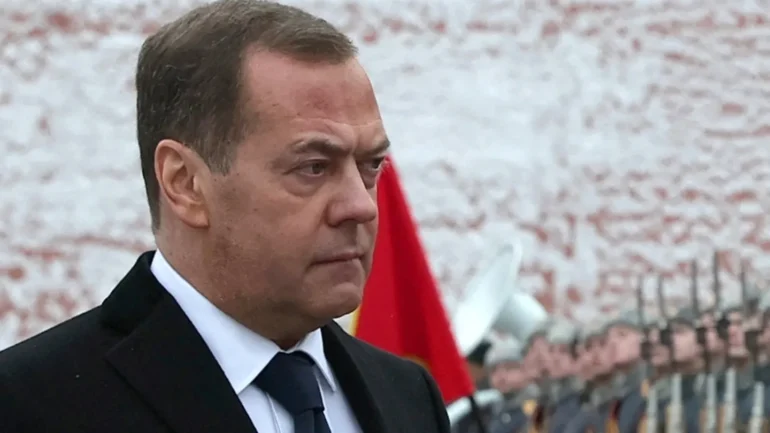On Monday, June 23, 2025, President Donald Trump fiercely criticized former Russian President Dmitry Medvedev for suggesting that multiple countries might supply Iran with nuclear warheads. This provocative claim followed U.S. airstrikes on Iran’s nuclear facilities, escalating global tensions and raising fears about nuclear proliferation.
The Spark: Medvedev’s Bold Claim
Dmitry Medvedev, now deputy chairman of Russia’s Security Council, posted on X early Sunday, claiming that the U.S. strikes on Iran’s nuclear sites—Fordow, Esfahan, and Natanz—caused only minor damage. He asserted that Iran’s nuclear program would continue and that “a number of countries are ready to directly supply Iran with their own nuclear warheads.” This statement alarmed U.S. officials and prompted a swift response from Trump.
Medvedev, who served as Russia’s president from 2008 to 2012, also mocked Trump, saying he had “pushed the US into another war” and could “forget about the Nobel Peace Prize.” Russian President Vladimir Putin echoed this criticism, calling the U.S. strikes “absolutely unprovoked aggression” and pledging support to Iran.
Trump’s Fiery Response
Taking to Truth Social, Trump expressed disbelief at Medvedev’s remarks, questioning if he was “casually throwing around the ‘N word’ (Nuclear!).” He emphasized that nuclear matters should not be treated lightly and demanded immediate confirmation of Medvedev’s statement. Trump also took a jab at Medvedev, suggesting he lacks authority compared to Putin, whom Trump called “THE BOSS.”
Trump didn’t stop there. He boasted about the U.S. military’s prowess, particularly its nuclear submarines, which he described as “the most powerful and lethal weapons ever built.” He claimed these submarines launched 30 Tomahawk missiles during the strikes, all hitting their targets perfectly. Trump also suggested that the attacks “obliterated” Iran’s nuclear ambitions, a claim contradicted by the International Atomic Energy Agency, which reported no significant off-site radiation and minimal damage to Iran’s facilities.
The Bigger Picture: U.S.-Iran Tensions
The U.S. strikes, carried out on Saturday, June 21, 2025, involved seven B-2 bombers and fighter jets targeting Iran’s key nuclear sites. The operation aimed to halt Iran’s ability to enrich uranium to weapons-grade levels. Defense Secretary Pete Hegseth and Trump claimed the strikes were a success, with Trump describing the damage as a “bullseye.” However, satellite images from Maxar Technologies showed only moderate damage, with craters and blocked tunnel entrances at Fordow but no evidence of total destruction.
Vice President JD Vance, in a Sunday interview, was more cautious, saying the U.S. had likely set Iran’s nuclear program back significantly but couldn’t confirm its complete destruction. Meanwhile, Iran vowed retaliation, launching ballistic missiles at a U.S. airbase in Qatar on Monday, further escalating the conflict.
Global Reactions and Risks
Medvedev’s comments have raised concerns about nuclear proliferation. If countries were to supply Iran with nuclear warheads, it could destabilize the Middle East and beyond. Russia, a long-time ally of Iran, has not actively supported Iran’s response to recent Israeli strikes but signaled readiness to assist after the U.S. attacks. Iranian Foreign Minister Abbas Araghchi was set to meet Putin on Monday to discuss the situation.
Trump, meanwhile, has called for Iran to restart negotiations to end its nuclear program, threatening further U.S. action if it refuses. He is scheduled to meet with his national security team to address the escalating crisis.
What’s at Stake?
The exchange between Trump and Medvedev highlights the delicate balance of global power and the dangers of nuclear rhetoric. While Trump touts U.S. military strength, Medvedev’s provocative remarks underscore the risk of other nations intervening in the U.S.-Iran conflict. The situation remains volatile, with Iran’s retaliation and Russia’s potential involvement adding to the uncertainty.
As tensions rise, the world watches closely, hoping diplomacy can prevent a slide into a broader conflict with catastrophic consequences.
